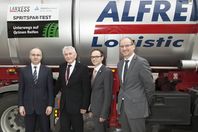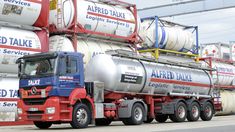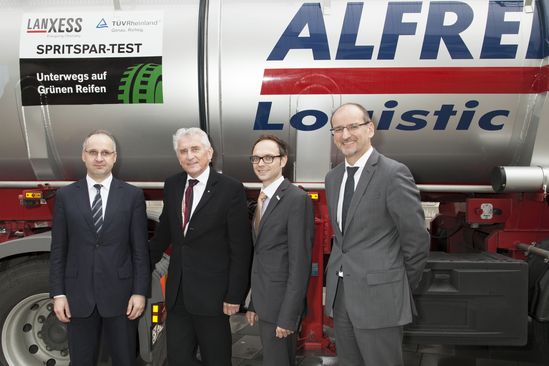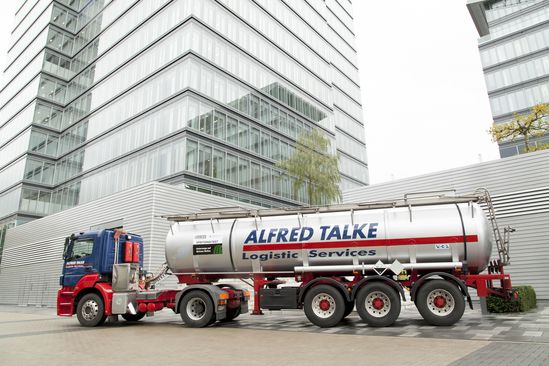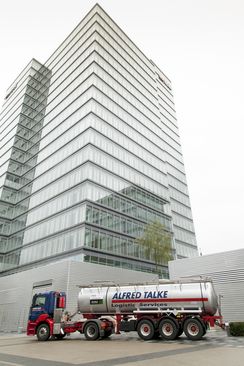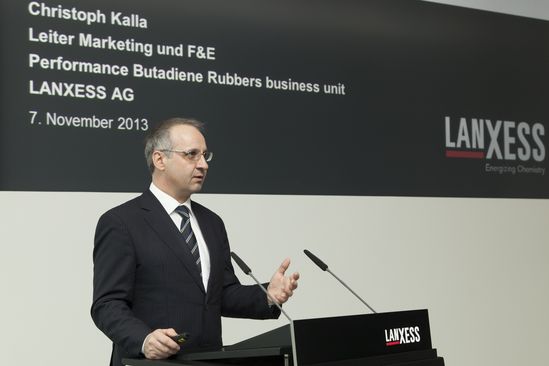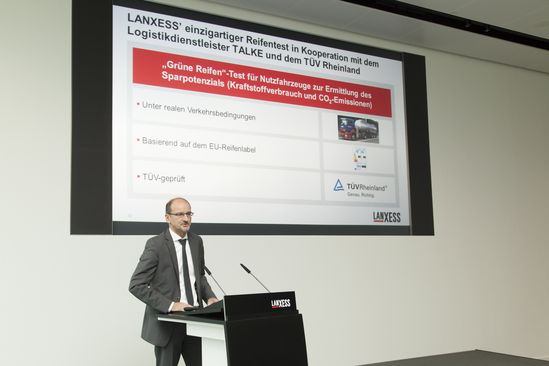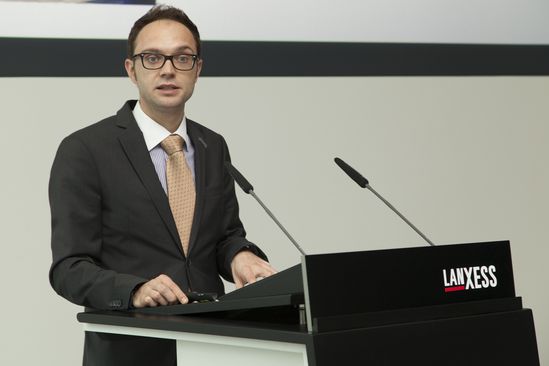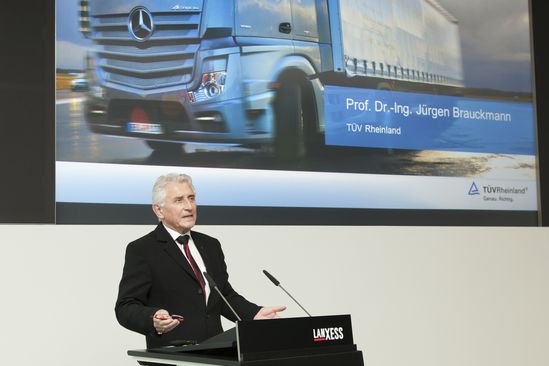Asia
EMEA

LANXESS Canada Contacts
Contact our Sites in Canada
Media Inquiries
General Inquiries
Please click here to e-mail LANXESS Canada with product inquiries and general requests.
Global Press Releases
2013-11-07
One year of EU tire labeling
LANXESS road test: trucks achieve fuel savings of almost 10 percent due to “Green Tires”
- Truck tire road test with chemical logistics provider TALKE
- Results verified by TÜV Rheinland
- Sample calculation: a fleet of 300 trucks saves 1.5 million euros a year in fuel costs by using “Green Tires”
- Market study: rolling resistance is a key criterion for carriers when purchasing tires
- LANXESS fleet calculator calculates individual potential savings
“Green tires” reduce the fuel consumption of trucks by 8.5 percent and can save carrier and logistics companies several million euros a year. These quality tires, with optimized rolling resistance, also significantly reduce CO2 emissions in commercial vehicles compared to standard tires. These are the results of a road test on truck tires. It was carried out by LANXESS, the world’s leading manufacturer of synthetic high-performance rubbers for the tire industry, and chemical logistics provider TALKE.
“As a fitting tribute to the first year of compulsory tire labeling within the EU, we have proved in this test that quality tires with optimized rolling resistance provide large potential savings for commercial vehicles,” said Christoph Kalla, expert for tires and rubber at LANXESS. “Not only are ‘Green Tires’ exceptionally effective at lowering operating costs, they also make a key contribution to protecting the environment.”
The full extent of the economic benefits of switching to “Green Tires” for a logistics company can be seen in a numerical example derived from the test: a fleet with a total of 300 40-metric-ton trucks that have previously been running on tires rated D on the EU label can save 1.5 million euros a year in fuel costs, just by switching to B-rated tires – assuming a distance of 150,000 kilometers per vehicle and a fuel price of EUR 1.40/liter. The CO2 reductions would amount to more than 3,000 metric tons per year.
Results that work for logistic companies: “For us, professional fleet management has long included using tires optimized in terms of their rolling resistance to make fleet operation more efficient, cost-effective and environmentally friendly,” said Alfred Talke, Group Managing Director of the TALKE Group. “The tire test carried out in collaboration with LANXESS has once again impressively demonstrated to us just how much we have already managed to save in the past few years. We hope that our industry will become much more aware of this example.”
TÜV Rheinland verifies test results
One of the world's leading independent technical service organizations, TÜV Rheinland, examined the entire test and documented and verified all the results. “Based on the EU tire label, we accompanied a realistic truck driving trial. We were pleased to see that the results proved that using tires with low rolling resistance leads to substantial fuel savings,” said Juergen Brauckmann, member of the Board of Management of TÜV Rheinland Berlin Brandenburg Pfalz e. V. “When it comes down to it, using these tires is an enormous contribution to sustainability in the logistics industry.”
Details of the LANXESS practical test for truck tires
Between August and October, two 40-metric-ton trucks of identical construction from the chemical logistics provider TALKE each drove the same route from the town of Huerth, Germany, to Loos, France, and back 30 times. Each of these round-trips was approximately 650 kilometers, of which the trucks were on the highway for 635 kilometers. Driver, loaded weight and refueling procedures were always identical for both trucks. Over the length of the trial, the two trucks covered a total distance of 40,000 kilometers.
To ensure that the test vehicles had exactly the same fuel consumption, both 40-metric-ton trucks started off using identical “Green Tires” with a B rating on the EU label. Half-way through the test, one vehicle was fitted with standard, D-rated tires. The result: the truck using “green” B-rated tires consumed 25.4 liters of fuel per 100 kilometers – 2.36 liters less than its counterpart on D-rated tires. This is equivalent to a saving of 8.5 percent of fuel. The vehicle on B-rated tires also emitted a good 700 kilograms less CO2 per 10,000 kilometers.
Market study: rolling resistance the third most important purchasing criterion
In addition to the road test, TÜV Rheinland asked 50 carrier companies for their opinion on tires with optimized rolling resistance:
The results showed that, for carrier companies, this is the third most important criterion when purchasing tires, after mileage and price. More than half of the carriers surveyed said they intended to buy tires with low rolling resistance next time. However, only half of the companies surveyed were confident that “Green Tires” really would result in noticeable savings. “This shows there is still a need for more information about the savings and environmental benefits ‘Green Tires’ bring,” said Christoph Kalla from LANXESS.
LANXESS fleet calculator helps save fuel
LANXESS provides a specially designed calculation program for fleets, the “LANXESS vehicle fleet calculator”. This helps operators reduce their vehicles’ fuel consumption efficiently and lower operating costs.
“It enables fleet operators to calculate for themselves how much fuel they could save in the long term by switching their vehicles to ‘Green Tires’. The program also shows the point from which it is worthwhile making that kind of investment and the reduction in fleet CO2 emissions,” explained Axel Vassen, Head of Public Affairs International and fleet expert at LANXESS.
LANXESS developed the Fleet Calculator in collaboration with the Technical University of Munich. The full program is available free of charge on the internet, requiring only a brief registration process, at http://flotte.green-mobility.de/en .
One year of compulsory EU labeling
Compulsory labeling of new tires within the European Union came into force on November 1, 2012. This applies to tires for all vehicles, including private cars and light and heavy commercial vehicles. The label grades the rolling resistance (i.e. fuel consumption) of a make on a scale of A (low) to G (high). It also provides buyers with information about wet grip (safety) and the rolling noise volume of the tire. “Green tires” attain particularly good marks on the EU label.
“With their tailor-made performance profile, synthetic rubbers make a significant contribution to the improved characteristics of ‘Green Tires’,” said Christoph Kalla. “Further development of these materials will in the future make it possible for tire manufacturers to reduce rolling resistance even more – without having to compromise on safety or mileage.”
LANXESS is a leading specialty chemicals company with sales of EUR 9.1 billion in 2012 and roughly 17,500 employees in 31 countries. The company is currently represented at 52 production sites worldwide. The core business of LANXESS is the development, manufacturing and marketing of plastics, rubber, intermediates and specialty chemicals. LANXESS is a member of the leading sustainability indices Dow Jones Sustainability Index (DJSI) World and FTSE4Good as well as the Carbon Disclosure Leadership Index (CDLI).
- Gallery

